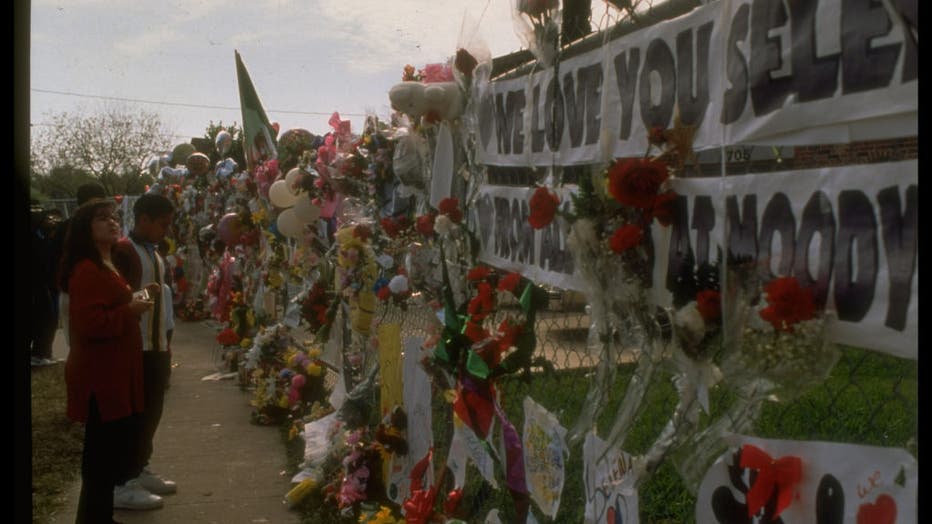Selena's killer, Yolanda Saldivar, denied parole
American singer Selena rides in a carriage during a performance at the Houston Livestock Show & Rodeo at the Houston Astrodome, Houston, Texas, February 26, 1995. The performance was her last before her murder the following month. (Photo by Arlen
AUSTIN, Texas - The woman convicted of killing Tejano music star Selena 30 years ago was denied parole Thursday because of the nature of the offense, the Texas Board of Pardons and Paroles said.
Yolanda Saldivar, 64, was convicted of shooting Selena, full name Selena Quintanilla-Perez, at a Days Inn in Corpus Christi on March 31, 1995.
She's currently serving a life sentence.
What they're saying:
"After a thorough consideration of all available information, which included any confidential interviews conducted, it was the parole panels determination to deny parole to Yolanda Saldivar and set her next parole review for March 2030," the Board of Pardons and Paroles said in a statement. "The reason provided by the panel for denial was the Nature of the Offense: The record indicates that the instant offense has elements of brutality, violence, assaultive behavior or conscious selection of victim’s vulnerability indicating a conscious disregard for the lives, safety, or property of others, such that the offender poses a continuing threat to public safety."
What we know:
In Texas, inmates can be considered for parole once the required amount of time is served and the offense is a parole-eligible offense, according to the Texas Department of Criminal Justice.
The process begins around six months before they become eligible for parole.
As part of the process, trial officials and registered victims receive a notice that allows for their input in the process, TDCJ officials said. An Institutional Parole Officer will conduct and interview with Saldivar, and a file is sent to the voting parole panel.
What's next:
Saldivar's case will be eligible for parole review again in March 2030.
March 31, 1995
The backstory:
Quintanilla-Perez was fatally shot in a motel room in Corpus Christi in March 1995.
Salidivar had been the president of Quintanilla-Perez's fan club and manager of the singer's clothing stores, but had been removed as president and taken off the singer's business checking accounts about two weeks prior to the shooting, according to court filings from Saldivar's 1998 appeal.

Crowd of fans paying tribute to Tejano singer Selena, who was shot to death by her former fan club pres. Yolanda Saldivar, outside Selena's family home. (Photo by Barbara Laing/Getty Images)
Prosecutors said Quintanilla-Perez confronted Saldivar about money missing from the accounts and Saldivar shot the singer in the back as she was leaving the room.
Quintanila-Perez ran to the lobby of the hotel, where she told motel staff that Saldivar shot her before collapsing and passing out.
The singer would die that afternoon. She was 23.
Saldivar was arrested after a nine-hour standoff with police in the motel's parking lot.
The "Queen of Tejano Music"

Singer Selena (Quintanilla) receives Grammy Award at The 36th Annual Grammy Awards on March 1, 1994 in New York, New York at Radio City Music Hall. (Photo by Larry Busacca/Getty Images)
By the Numbers: Quintanilla-Perez won a Grammy in 1994 for Best Mexican-American Album for "Live." It was the first time a female Tejano artist had won the category.
Quintanilla-Perez had four songs from her fourth album, "Amor Prohibido," reach number one on the Billboard Hot Latin Songs list: "Amor Prohibido," "Bidi Bidi Bom Bom," "No Me Queda Mas," and "Fotos Y Recuerdos."
The album reached number 29 on the Billboard 200 and was nominated for a Grammy.
The year after her death, Quintanilla-Perez's English-language crossover album, "Dreaming of You," reached the top of the Billboard 200. Two songs on the album appeared on the Billboard Hot 100 chart: "I Could Fall in Love" reached number eight and "Dreaming of You" reached 22.
The other side:
Saldivar has filed appeals on multiple occasions.
In her 1998 appeal, Saldivar's attorneys argued 17 points of error in the trial, including the exclusion of jurors based on race, admitting prejudicial or irrelevant evidence, denying a motion for a mistrial and denying a motion for a new trial.
In 2019, Saldivar filed an appeal on the grounds that prosecutors withheld a pair of white shoes and a black baseball cap that would have been favorable to her during trial, claiming prosecutors never allowed the defense to see them, but had them during a 2018 interview.
Saldivar's appeals have been unsuccessful.
The Source: Information in this article comes from the Texas Board of Pardons and Paroles and past FOX coverage.

